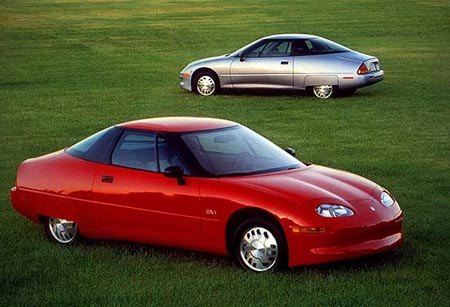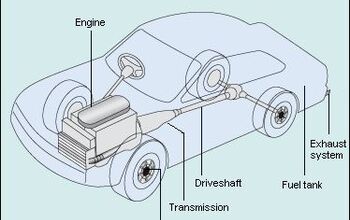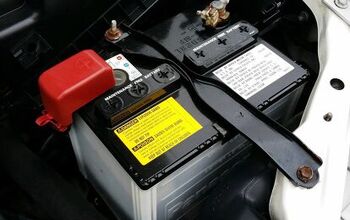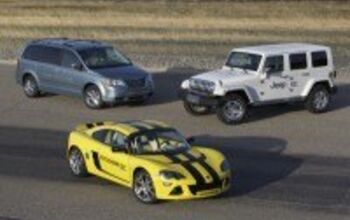Electric Car Killer Revealed!
C/net News editor Michael Kanellos tackles that most filmic of questions: who killed the electric car? His answer: no one. Well, not intentionally. Kanellos rejects the idea that there was a carmaker-led conspiracy to kneecap battery-powered transportation. "The most innovative things they've come up with in three decades are the cupholder and the Lee Iacocca goggle glasses. These people are going to engineer a global conspiracy that eludes regulators around the world, financiers and competitors?" Kanellos says electric car technology simply couldn't meet the demands of the average consumer. Or, as he puts it, "consumers are cheap and don't want to be inconvenienced by a car that will die on the freeway before they get to Ikea's produce and burger stand when they're driving from the Bay Area to Lake Tahoe." 'Nuff said?
More by Frank Williams


































Comments
Join the conversation
"The Buyers Have Spoken: Forget Electric Cars" by Patrick Bedard in Car & Driver for January 2004: ... GM invested something north of $1.5 billion and built about 1000 EV1 two-seaters. A handful of customers were wildly enthusiastic. Everyone else sat on their checkbooks. EV1s stacked up in inventory. The sub-tepid demand became a joke around the industry. In 1999, GM ended EV1 production with no plans to replace it. The company said folks didn't want cars that must spend more time on a charger than on the road. California responded to common sense as it usually does—it shot the messenger. It accused GM of killing in the cradle an air-pollution solution the state desperately needed. ... Inquiring minds still wonder, however, who was right: GM, when it said there were no customers for battery EVs, or CARB and the Green Car Institute and the rest of the knee-jerk enviros, when they loudly insisted for years that demand was huge? Toyota, I'm now convinced, has the answer. Ernest Bastien, head of the company's Vehicle Operations Group, showed me the results of a very careful study it had done of buyers who actually bought cars. Polls that ask folks, "Would you buy a . . . ?" are a dime a Dumpsterful. In California, where everyone talks like a Sierra Clubber, it's a no-brainer to say yes when asked about an EV. But when real customers put down their own cash, you'd better listen. By 2001 Toyota had lots of real-world experience with green cars. Starting in 1998, it offered the RAV4 EV to fleet customers. This was a battery-powered electric with a range of 80 to 100 miles between charges. More than 1000 were on the road. ... Toyota decided to test EV demand by offering the RAV4 EV through the Prius-proven channel. This would be a California-only program involving 25 specially trained dealers around the state. Test drives would be available once the purchaser made a tentative commitment on the Internet. Toyota did plenty of advertising and promotion around the state, and nationally—everything from bus-shelter posters and outdoor billboards to TV spots—to let the public know the car was coming. Lease price, after certain tax credits, matched the $329 a month for the Prius (no profit here, given that Jim Olson, Toyota's senior vice-president, had already stated that the manufacturer's cost of such a car would be "more than $100,000"). Toyota tried to do right what other EV sellers had done wrong. First, the RAV4 was a real SUV with practically the same interior space as the gasoline version, not some tightly packaged two-seater of limited usefulness. The charger was included in the price, and a professional installing company was ready to go (the customer had to pay for installation). As opposed to the lease-only EV1, buyers could own a RAV4 EV; list price was $42,000 before tax incentives. One more detail: Toyota gave dealers a reason to push the electric car by boosting the profit margin on the RAV4 EV to $2000 above the Prius. What happened? Sales were feeble, only 47 cars in the first two weeks, just eight percent of what the Prius had done after its launch. And then they slumped: 213 EVs over six months compared with 3262 for the Prius. EV enthusiasts have always talked of huge pent-up demand. Nope. More ominous still, in a follow-up study of the first 120 buyers, 87 responded, and 19 of them had bought the RAV4 EV to replace an EV they had been driving previously. Also significant, 40 of those buyers did not consider another model. That suggests loyalty, yes, but also a tiny cadre of true believers, and not much interest in the broader market. Worse yet, sales had dropped to about six per week after four months and leveled off there. Green rapture didn't translate into EV sales. Ground zero for Sierra Clubbers is Berkeley, California, and Toyota of Berkeley had been the top Prius seller in the first six months, more than 100 cars, with San Francisco Toyota just behind. Each of them sold fewer than 10 RAV4 EVs in the same period. Toyota concluded, as had GM before it, that there was no possibility of developing a profitable business with electric cars and ended the program after six months. Battery electric cars are simply not going to happen for a very sensible reason: Customers don't want them.
In 1996, there were 3.8 million vehicles registered in Minnesota. There are now 3.1 million drivers. It's hard to believe that, given the better than 1:1 vehicle-to-driver ratio, that an EV of modest range wouldn't sell into a decent number of multi-car families. I suppose it would have to be priced right and the Prius does have that going for it.
The problem with EVs seems to be twofold: nobody wants one if it's expensive or less useful than a regular car and they won't become as cheap and useful as regular cars until everyone wants one. In other words, the usual catch-22. That said, I think GM's abandoning the EV1 was the biggest dumb mistake they ever made (well, second biggest, after deciding not to bother making small cars). GM spent a lot to make them but then let the tech rot, when they should used the EV1 as a testbed for developing usable technology. If they had just kept going with it, they would be ahead of Toyota on battery tech now. Aside from that, aerodynamic and other ideas from the EV1 could have been used to develop better small cars. They could have developed the electric extras that it looks like will become huge in the near future - electric power steering and such. Instead they dropped it in favor of a quick buck. The EV1 may not have been profitable but it could have launched a thousand profitable technologies. GM dropped the ball. Right now we're all talking about how crappy electric cars are and so on, but hybrids are common and will no doubt become ubiquitous, and when the next gas crunch comes maybe even EVs will seem sensible. Auto journalists who think still be running on gas 100 years from now have sniffed too much of it. The only question is when in the next 100 years the switch away from gas will happen.